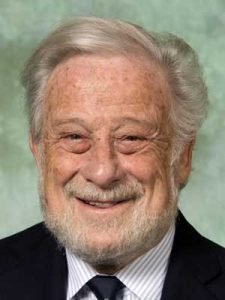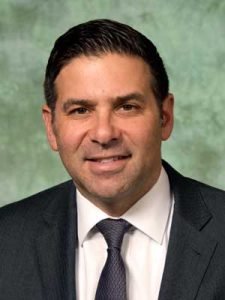Board of Trustees
BYLAWS
CLICK TO EXPAND
AMENDED AND RESTATED
BY-LAWS
OF
CURRENT CONCEPTS FOUNDATION
(an Ohio Non-Profit Corporation)
Mission
Promoting educational opportunities in orthopaedics.
ARTICLE I
Members
Section 1. Members
The Corporation shall have no members. The members of the Board of Directors (also referred to as “Trustees”) shall, for the purposes of Chapter 1702 of the Ohio Revised Code, be deemed to be the Members of the Corporation.
ARTICLE II
Board of Directors
Section 1. General Powers
All of the authority of this Corporation shall be exercised by the Board of Directors, except as otherwise provided in the Articles of Incorporation or by Chapter 1702 of the Ohio Revised Code. A Director shall perform his duties as a director in good faith; in a manner reasonably believed to be in the best interests of the Corporation, and with the care that an ordinarily prudent person in a like position would use under similar circumstances. A member of the Board of Directors, or a member of any committee designated by the Board of Directors, shall, in the performance of such member’s duties, be fully protected in relying in good faith upon the records of the corporation and upon such information, opinions, reports or statements presented to the corporation by any of the corporation’s Officers or employees, or committees of the Board of Directors, or by any other person as to matters the member reasonably believes are within such other person’s professional or expert competence and who has been selected with reasonable care by or on behalf of the corporation.
Section 2. Number
The Board of Directors of this Corporation shall consist of not fewer than 5 and no more than 9 Directors.
Section 3. Election
The Board of Directors shall be elected at the annual meeting of Directors, or if not then elected, or if such meeting not be held at the time fixed therefore, then at a special meeting of the Directors held for the purpose of election of Directors. Persons and remain in same position until replaced by a two thirds vote of the Directors:
A. Seth Greenwald, D.Phil.(Oxon)
John M. Cuckler, M.D.
Richard E. Jones, M.D.
The Officers/Advisors are as follows:
President, A. Seth Greenwald, D.Phil.(Oxon)
Secretary/Treasurer, Christine S. Heim
Legal Counsel, Gregory D. Seeley
Only persons nominated as candidates shall be eligible for election. Candidates may be nominated who are not members of the Board of Directors. At all elections of Directors, the candidates receiving the greatest number of votes shall be elected.
Section 4. Term
Each Director elected at any annual or any special meeting of the Members shall serve until the next annual meeting of Directors and until his successor is elected, or until his earlier resignation, removal from office or death.
Section 5. Vacancies
The office of a Director shall become vacant if he/she dies, no longer holds the position for which he/she is named or resigns, which resignation shall take effect immediately or at such other time as said Director resigning may specify. The remaining Directors, though less than a majority of the whole authorized number of Directors, shall, by a vote of the majority of their number fill the vacancy in the Board for the unexpired term in accord with the representative position or as an appointed member. The Director elected to fill a vacancy shall serve until the next annual meeting of Directors or until his successor is elected and qualified.
Section 6. Removal
All of the Directors or any individual Director may be removed from office by the vote of a majority of the members present at a meeting of Directors called for the purpose of removing Directors, if a quorum is present. Such removal shall create a vacancy or vacancies on the Board.
Section 7. Annual Meetings; Special Meetings
The annual meeting of the Board of Directors shall be held in order to elect Directors with at least two (2) days written notice mailed to each Director. Special meetings of the Board of Trustees may be called from time to time by the Chairman, President, any Vice President or any two Trustees. All meetings of the Board of Trustees shall be held at the office of the Foundation in Cleveland, Cuyahoga County, Ohio or at such other places, as the President or the Board of Trustees may designate from time to time and as may be specified in the notice of meeting. Meetings of the Board of Trustees may be held through any means of communication equipment if all persons participating can hear each other.
Section 8. Notice of Meetings
Notice of meetings of the Board of Directors shall be mailed to each Director, addressed to him at his residence or usual place of business or delivered to him personally, at least two (2) days prior to the holding of such meeting. Every such notice shall state the time and place of the meeting, but shall not be required to state the purpose thereof. Notice of any meeting of the Board of Directors need not be given to any Director, (a) if waived by him in writing and such waiver is filed with the Secretary either before or after the holding of such meeting, or (b) if he shall be present at said meeting without protesting, prior to or at the commencement of such meeting, the lack of proper notice. Notice of adjournment of a meeting need not be given if the time and place to which it is adjourned are fixed and announced at such meeting.
Section 9. Quorum
At all meetings of the Board of Directors a majority of the whole authorized number of Directors with a right to vote is necessary to constitute a quorum for the meeting of such Board of Directors, except that a majority of the Directors in office constitutes a quorum for filling a vacancy in the Board of Directors. The act of a majority of the Directors present at a meeting at which a quorum is present is the act of the Board.
Section 10. By-Laws
For the government of its actions, the Board of Directors may adopt rules and regulations consistent with the Articles of Incorporation and these By-Laws.
Section 11. Action Without Meeting
Any action which may be authorized or taken at a Directors’ meeting may be authorized or taken without a meeting in a writing or writings signed by all of the Directors who would be entitled to notice of a meeting of the Directors held for such purpose, and such writing or writings shall be made a part of the records of this Corporation.
Section 12. Committees of the Board of Directors
The Board of Directors may create standing committees or ad hoc committees as the Board of Directors shall deem appropriate, with such membership, powers and duties as may be deemed necessary or advisable in conducting the business, activities and affairs of the Corporation, and shall elect the members thereof.
Section 13. Conflicts of Interest
No contract or transaction between the corporation and one (1) or more of its Directors or Officers, or between the corporation and any other corporation, partnership, association, or other organization in which one (1) or more of its Directors or Officers, are Directors or Officers, or have a financial interest, shall be void or voidable solely for this reason, or solely because the Director or Officer is present at or participates in the meeting of the Board or committee which authorizes the contract or transaction, or solely because any such Director’s or Officer’s votes are counted for such purpose, if:
(1) The material facts as to the Director’s or Officer’s relationship or interest and as to the contract or transaction are disclosed or are known to the Board of Directors or the committee, and the Board or committee in good faith authorizes the contract or transaction by the affirmative votes of a majority of the disinterested Directors, even though the disinterested Directors be less than a quorum; or
(2) The material facts as to the Director’s or Officer’s relationship or interest and as to the contract or transaction are disclosed or are known to the Directors entitled to vote thereon, and the contract or transaction is specifically approved in good faith by vote of the Directors; or
(3) The contract or transaction is fair as to the corporation as of the time it is authorized, approved or ratified, by the Board of Directors.
Common or interested Directors may be counted in determining the presence of a quorum at a meeting of the Board of Directors which authorizes the contract or transaction.
The Directors may receive compensation for serving as Directors and shall be reimbursed for expenses incurred by them in the exercise of their service.
A Director is not an interested Director solely because the subject of a contract, action, or transaction may involve or effect a change in control of the Corporation or his continuation in office as a Director of the Corporation.
A Director shall not be found to have failed to perform his duties, unless it is provided, by clear and convincing evidence, in an action brought against the Director that he has not acted in good faith, in a matter he reasonably believes to be in or not opposed to the best interests of the corporation, or with the care that an ordinarily prudent person in a like position would use under similar circumstances.
ARTICLE III
Officers
Section 1. General Provisions
The Officers of the Corporation shall consist of a President, such number of Vice Presidents as the Board may, from time to time, determine, a Secretary and Treasurer. The Board of Directors may, from time to time create such offices and appoint such other Officers and Assistant Officers as it may determine. The Officers shall be elected by the Board of Directors. Any two of such offices may be held by the same person, but no Officer shall execute, acknowledge or verify any instrument in more than one capacity. The Officers elected by the Board of Trustees shall be paid such compensation as the Board of Trustees may from time to time determine.
Section 2. Term of Office
The Officers of the Corporation shall hold office until the organizational meeting of the Board of Directors following the date of their election and until their successors are chosen and qualified unless sooner removed by the Board of Directors. The Board of Directors may remove any Officer at any time, with or without cause, by a majority vote. A vacancy in any office, however created, may be filled by the Board of Directors.
Section 3. President and Vice President
The President shall preside at all meetings of Directors as Chairman and shall be the Chief Executive Officer of the Corporation. He shall have general supervision, management, control and oversight of the business of the Corporation, subject to this Code of Regulations and subject to the orders of the Board of Directors, and shall, in general, perform all the duties usually incident to the office of President or that may be imposed or required by the Board of Directors. In his absence or inability to act, the Vice President shall discharge the duties of the President and shall perform such other duties as shall be determined by the Board of Directors.
Section 4. Secretary
The Secretary shall (a) keep minutes of all of the meetings of the Board of Directors, as well as all Actions by Written Consent and waivers of notice; (b) give notice of all meetings of Directors, except as otherwise provided by these By-Laws; (c) keep such books as may be required by the Board of Directors and (d) perform such other duties as may be assigned to him from time to time by the Board of Directors or by the President. All books and papers pertaining to the office of the Secretary shall be subject at any time to the inspection of any member of the Board of Directors, and, on the expiration of the Secretary’s term of office such Secretary shall deliver all books, papers and other property of the Corporation in his possession or under his control to the President or to the Secretary’s successor in office; and, in general, the Secretary shall perform all duties pertaining to such office as may be required by the President or Board of Directors.
Section 5. Treasurer
The Treasurer shall have general supervision of all finances; he shall receive and safely keep all moneys belonging to the Corporation and he shall perform such other duties as from time to time may be assigned to him by the Board of Directors. He shall keep proper books of account and keep accurate account of the finances of the Corporation and shall present, at least at the annual meeting of Directors, a statement of profit and loss of the corporation, and a balance sheet containing a summary of the assets and liabilities, stated capital and surplus as of the close of the Corporation’s fiscal year. The financial statement shall have appended thereto a certificate signed by the President or a Vice President and the Treasurer or an Assistant Treasurer or by a public accountant or a firm of public accountants, to the effect that the financial statement presents fairly the financial position of the Corporation and the results of its operations in conformity with generally accepted accounting principles applied on a basis consistent with that of the preceding period or such other certificate as is in accordance with sound accounting practice. At any meeting of the Board of Directors, the Treasurer shall furnish summary statements of the financial condition of the Corporation as of the date requested by the President or the Board of Trustees. Upon the expiration of his term of office, the Treasurer shall deliver all money, books, papers and other property of the Corporation that shall be in his possession or under his control to his successor in office.
ARTICLE IV
Indemnification of Trustees and Officers
Each Trustee, Officer, Director, Agent, employee or volunteer of this Corporation, and any Trustee, Officer, Director, Agent, employee or volunteer of any other corporation serving as such at the request of this Corporation shall be indemnified by this Corporation under the standards set by and to the fullest extent allowable under Sections 1702.12, 1702.30 and 1702.55 of the Ohio Revised Code, as the same shall be amended from time to time.
The foregoing right of indemnification shall be in addition to any other rights to which any person seeking indemnification may be or become entitled by law, vote of disinterested Directors of this Corporation or otherwise.
ARTICLE V
Amendments
The Directors at a meeting held for such purpose, may adopt an amendment to these By-Laws by the affirmative vote of a majority of the total members of the Board of Directors. In addition to or in lieu of adopting an amendment to the By-Laws, the Directors may adopt amended By-Laws by the same action or vote as that required to adopt the amendment.
ARTICLE VI
Miscellaneous
Section 1. Fiscal Year
The fiscal year of the Corporation shall end on December 31 in each year or on such other day as may be fixed from time to time by the Board of Directors.
Section 2. Property
All property acquired by this Corporation by purchase, gift, bequest or otherwise shall be the absolute property of this Corporation, unless at the time of acquiring such property it is otherwise specified in writing.
Section 3. Sale or Disposition of Assets
The Board of Directors of this Corporation may authorize the lease, sale, exchange, transfer or other disposition of any of the assets of this Corporation without the necessity of procuring authorization from the court but may seek such authorization pursuant to Section 1702.40, Ohio Revised Code, and any such lease, sale, exchange transfer or other disposition shall be made in whole or in part for money or other property, including shares or other securities or promissory notes of any corporation for profit.
Section 4. Books and Records
The books and records of this Corporation may be examined by any Director or the agent or attorney of any Director for any reasonable and proper purpose at any reasonable time.
Section 5. Income and Principal
Notwithstanding any other provision of these Regulations, no part of the assets or income earned on the assets of the Corporation shall inure to the benefit of, or be distributable to its Directors, Officers, or other private persons. No substantial part of the activities of the Corporation shall be the carrying on of propaganda, or otherwise attempting to influence legislation, and the Corporation shall not participate in, or intervene in (including the publishing or distribution of statements) any political campaign on behalf of any candidate for public office. Notwithstanding any other provision of these Regulations, the Corporation shall not carry on any other activities not permitted to be carried on (a) by a corporation exempt from Federal income tax under Section 501(c)(3) of the Internal Revenue Code of 1986 (or the corresponding provision of any future United States Internal Revenue law) or (b) by a corporation, contributions to which are deductible under Section 170(c)(2) of the Internal Revenue Code of 1986 (or the corresponding provision of any future United States Internal Revenue Law).
Section 6. Merger
The Board of Directors of the Corporation may authorize the merger or consolidation of this corporation with other corporations as permitted by Section 1702.41 of the Ohio Revised Code.
Section 7. Dissolution
Upon the dissolution of the Corporation, the Board of Directors shall, after paying or making provision for the payment of all the liabilities of the Corporation, dispose of all of the assets of the Corporation exclusively for the purposes of the Corporation, as set forth in its Articles of Incorporation, as amended, in such manner or to such organization or organizations organized and operated exclusively for charitable, educational, religious, or scientific purposes as shall at the time qualify as an exempt organization or organizations under Section 501(c)(3) of the Internal Revenue Code of 1986 (or the corresponding provision of any future United States Internal Revenue Law), as the Board of Directors shall determine. Any such assets not so disposed of shall be disposed of by the Court of Common Pleas of the county in which the principal office of the Corporation is located, exclusively for such purposes or to such organization or organizations, as said Court shall determine, which are organized and operated exclusively for such purposes.







